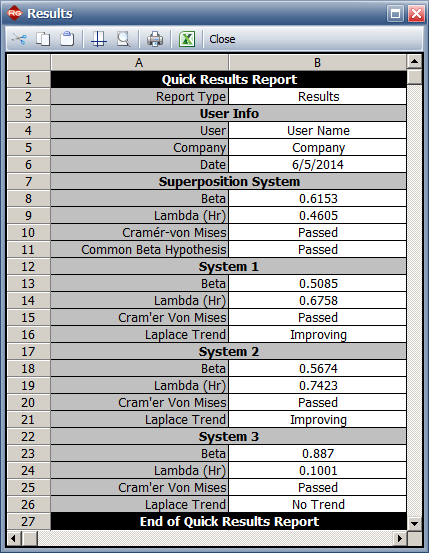Repairable Systems Analysis Reference Example: Difference between revisions
Jump to navigation
Jump to search
No edit summary |
Kate Racaza (talk | contribs) No edit summary |
||
| (24 intermediate revisions by 2 users not shown) | |||
| Line 1: | Line 1: | ||
{{Reference Example| | {{Reference Example|{{Banner RGA Reference_Examples}}|Repairable Systems Analysis}} | ||
This example validates the results for a repairable systems analysis in RGA. | |||
This example | |||
| Line 7: | Line 6: | ||
Crow, L.H., ''Reliability Analysis for Complex Repairable Systems'', Reliability and Biometry: Statistical Analysis of Lifelength, pg. 385, 1974. | Crow, L.H., ''Reliability Analysis for Complex Repairable Systems'', Reliability and Biometry: Statistical Analysis of Lifelength, pg. 385, 1974. | ||
For this example, the Power Law model parameters will be calculated. | |||
{{Reference_Example_Heading2}} | {{Reference_Example_Heading2}} | ||
{| {{table}} | The following table shows the data. | ||
{| {{table|25%}} | |||
!System 1 | !System 1 | ||
!System 2 | !System 2 | ||
| Line 48: | Line 49: | ||
| ||190.8|| | | ||190.8|| | ||
|- | |- | ||
|+'''Simulated Data for 3 Systems with End Time = 200 hours''' | |||
|} | |} | ||
{{Reference_Example_Heading3}} | {{Reference_Example_Heading3}} | ||
The book has the following results: | |||
Beta = 0.615, Lambda = 0.461 | Beta = 0.615, Lambda = 0.461 | ||
{{Reference_Example_Heading4| | {{Reference_Example_Heading4|RGA}} | ||
Since <math>\,\!S_{1}=S_{2}=S_{3}=0</math> and <math>\,\!T_{1}=T_{2}=T_{3}=200</math> then the maximum likelihood estimates of <math>\,\!\hat{\beta}</math> and <math>\,\!\hat{\lambda }</math> are given by: | Since <math>\,\!S_{1}=S_{2}=S_{3}=0</math> and <math>\,\!T_{1}=T_{2}=T_{3}=200</math> then the maximum likelihood estimates of <math>\,\!\hat{\beta}</math> and <math>\,\!\hat{\lambda }</math> are given by: | ||
::<math>\begin{align} | ::<math>\begin{align} | ||
\hat{\beta }=&\frac{\ | \hat{\beta} =&\frac{\underset{q=1}{\overset{K}{\mathop \sum }}N_{q}}{\underset{q=1}{\overset{K}{\mathop \sum }}\,\underset{i=1}{\overset{N_{q}}{\mathop \sum }}\ln \left ( \frac{T}{X_{iq}} \right )}\\ | ||
\\ | \\ | ||
=&0.6153 | =&0.6153 | ||
\end{align}\,\!</math> | \end{align}\,\!</math> | ||
::<math>\begin{align} | ::<math>\begin{align} | ||
\hat{\lambda }=&\frac{\ | \hat{\lambda }=&\frac{{\underset{q=1}{\overset{K}{\mathop \sum }}N_{q}}}{KT^{\hat{\beta }}}\\ | ||
\\ | \\ | ||
=&0.4605 | =&0.4605 | ||
| Line 77: | Line 79: | ||
The model parameters are: | |||
[[image:Repairable SystemS SIAM_Results.png|center]] | [[image:Repairable SystemS SIAM_Results.png|center]] | ||
Latest revision as of 18:26, 28 September 2015
New format available! This reference is now available in a new format that offers faster page load, improved display for calculations and images and more targeted search.
As of January 2024, this Reliawiki page will not continue to be updated. Please update all links and bookmarks to the latest references at RGA examples and RGA reference examples.

